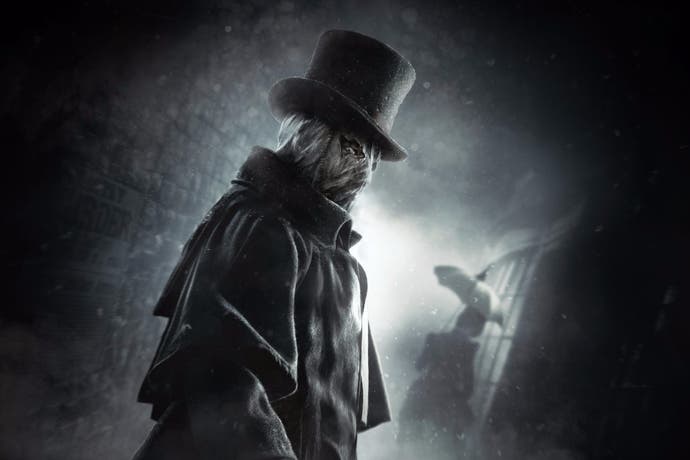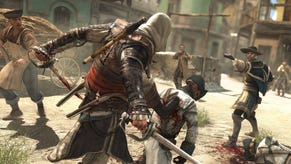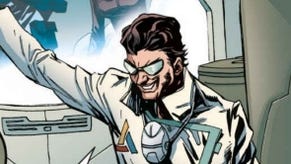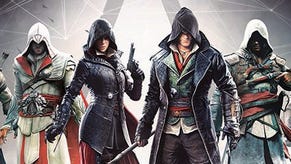Assassin's Creed Syndicate has learned from Unity's mistakes, but is that enough?
Industrial evolution.
I'm sat in Wapping Power Station at half nine in the morning listening to Ubisoft talk about Assassin's Creed Syndicate. The surroundings are fittingly Victorian, dotted with industrial machinery that likely once ran on adorable orphan labour. Creative director Marc-Alexis Côté is telling us how the game introduces its two main characters, Jacob and Evie Frye, and why his team are excited about Syndicate's London setting. But everyone sat listening really has just one question they want answering - can Syndicate revitalise the franchise following Assassin's Creed Unity?
Ubisoft's blockbuster series took a serious knock last year when Unity launched in a buggy and broken state. Player frustration at frame rate and graphical problems followed a bold marketing campaign that trumpeted the line: "Next-gen starts here". Fan response was pretty clear: it did not. Underneath all of that lay a decent if unremarkable entry in the series, albeit one launched alongside Rogue, a naval-focused follow-up for last-gen platforms which was arguably more entertaining. Ubisoft patched Unity over the course of several months then offered up its biggest add-on for free, but by then the damage was done.
So, Syndicate faces an uphill battle to regain player confidence when it launches this November. The silver lining from last year is that Ubisoft gained plenty of feedback on how it needed to improve and, happily, from the sections of Syndicate we played it feels like this has to some extent filtered through. It's clear that Syndicate is an Assassin's Creed game, but it's also clear that another year of technical knowledge and fine-tuning for the game's engine has produced a far better and more stable result. In the early build we played, Syndicate ran smoothly at all times.
The improved engine leads to better gameplay, too. Crowd sizes in Syndicate's London are smaller than those in Unity's Paris, but this also fits the time period. It has freed up engine power for horse-drawn carriages, one of the biggest new additions, which can be held up and stolen and driven all over the city. The cabs come in various guises, and those with a cart can be turned into a makeshift fight platform if pursuers catch up with you and jump aboard. Another major addition is the Batclaw grapple line from Rocksteady's Batman: Arkham series, which was apparently invented by the Assassins some 100 years before Bruce Wayne. It's a handy addition in a city full of tall buildings, and adds another level of parkouring possibilities.
It's also useful because of another change - the removal of most building interiors. Unity added these to the series but filled them, largely, with cookie-cutter environments. Syndicate retains building interiors for its set piece locations - you will be able to enter and explore many of London's landmarks, for example. But the fiddly ability to climb through random pubs, shops and apartments is gone, replaced by buildings that are simpler in shape and placement - which also helps the game's frame-rate.
"It's a combination of both creative and technical [reasons]," Marc-Alexis Côté tells me when we speak a little later. It must be tough directing the title that follows Unity, but Côté is upbeat and happy to talk about how the only history he wants Syndicate to repeat is the one his team have written in the game. "From a creative perspective it was a choice to focus on more detailed large-scale interiors - visiting important places," he says. "Because movement is so fast in Assassin's Creed, when you are in a cramped interior it doesn't feel as satisfying. We didn't feel that having generic interiors throughout the city was important to the fantasy. And it's a good compromise to make when we're looking at improving the performance of the game and making it run as smooth as possible."
Syndicate also revisits many features left out of Unity for whatever reason, be it a simple lack of time or an inexperience getting them working smoothly within the series' new engine. "We've brought a lot of things back," Côté explains. "Picking up bodies, throwing them, hiding them. [And we] removed stuff that didn't really add to the experience and affected the performance of the game. I preferred bringing back the whistle to having a companion app."
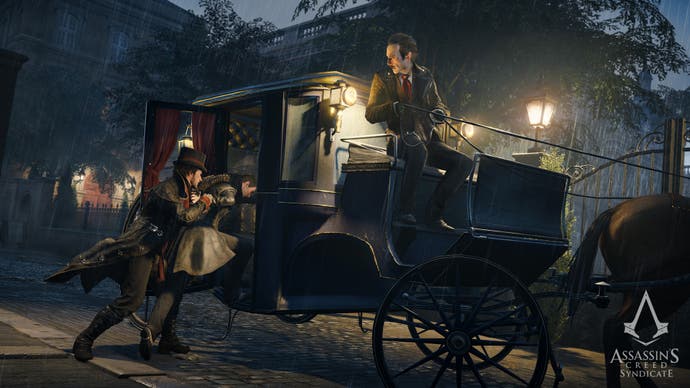
This year's Assassin's Creed will be the first since AC2 to not feature a multiplayer component of any kind. Unity introduced four player co-op to the series, although the impact of having three other people charging around environments designed for stealth was usually more of a hindrance. It was a nice idea, but not one that fans will miss. Integration with a companion app has also been removed, while Ubisoft's Assassin's Creed: Initiates tie-in web service has been quietly killed off.
These changes have left Ubisoft Quebec with the time to invest in features that core fans want, such as the inclusion of a meaningful modern day section. Last year's Unity only paid lip-service to the present day, leaving many fans to wonder why Ubisoft had bothered at all. "There's a good part of [the modern day story] that's coming back - fans are going to love it," Côté continues. "It's super important to the franchise because it's the reason you're going back into the past. You need to feel some kind of agency when you're in the present, like you're doing something that's of importance to the modern day Assassins."
Côté would not be drawn on what sort of experience to expect, but a quick look through the game's database of characters suggests that more than a couple of familiar faces will be making appearances (Danny Wallace fans, if you're out there, hello to you). Syndicate seems more comfortable with its history than Unity, which largely wiped the slate clean of all the complicated backstory before it. There's no suggestion that you'll need to read a wiki to understand everything that's going on, but simple things such the inclusion of factoids on major events in the series during loading screens show that Ubisoft is willing to try and give its overarching story another try.
The storytelling of Syndicate itself is also improved. Unity lacked a compelling plotline and its angsty tale of love lacked the conviction that a more detailed plot might have provided. With Syndicate, Assassin's Creed returns to more light-hearted roots with a bickering brother and sister on a clear mission - to take London from the Templars and topple its Grand Master. Your main enemy is revealed in the game's opening sequence, and each gameplay sequence that follows sees you edge ever closer to the king pin by assassinating ever-more important members of his evil hierarchy. It's very Assassin's Creed 2, which is no bad thing.
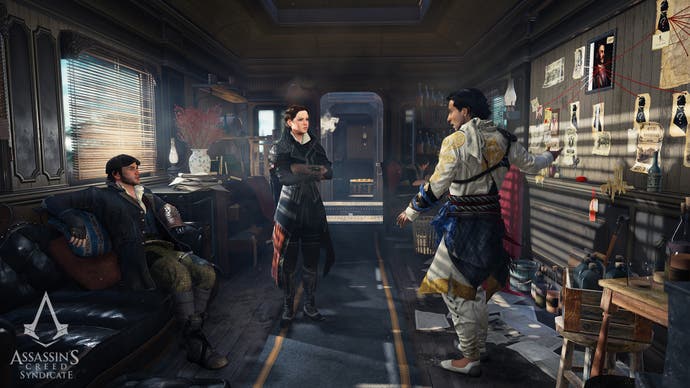
Helping you are a cast of followers with whom you will slowly gain reputation - a new mechanic to Assassin's Creed, and one which will let you slowly gain better gear from them. Gear has been simplified since Unity (your main clothing now simply counts as one item instead of many, with extra slots for your hat and belt). Looking back at Unity it is difficult to remember more than a couple of its characters, something which Syndicate hopes to rectify. Joining Jacob and Evie are British Indian Assassin Henry Green, head of the remaining London Assassins, and other familiar faces that will quickly fill your new hideout: a train that continually chuffs its way around the landscape of London. Syndicate also lets you interact with many historical characters of the time, including Charles Dickens, Charles Darwin, Florence Nightingale, Karl Marx, Alexander Graham Bell, Inspector Frederick Abberline and even Queen Victoria herself.
The other major change is the ability to play with two protagonists, each with their own personal skill tree of unique talents. Jacob's skills lean towards brute force, while Evie's will tailor to players fond of a stealthier approach. Your train hideout also has a skill tree of upgrades for London itself that will see you slowly wrestle power away from the industrialists and gather coin into your pockets instead. The usual Templar versus Assassin's story fits the Victorian era surprisingly well, with the plucky underdog Assassins drawing ranks from the downtrodden and excluded, to fight back against the evil capitalists and workhouse owners.
"We've taken the feedback seriously," Côté concludes. "We've heard the fans and are doing everything we can to improve the experience. We've taken a humble approach to designing Syndicate, which is I think indicative of the team back in Ubisoft Quebec. We want to build a game which makes Assassin's Creed fans happy." Key to that, he says, is that everyone should "have fun on day one. The game needs to be performing and as bug free as possible at launch." There's not long until we find out if this will be true.
